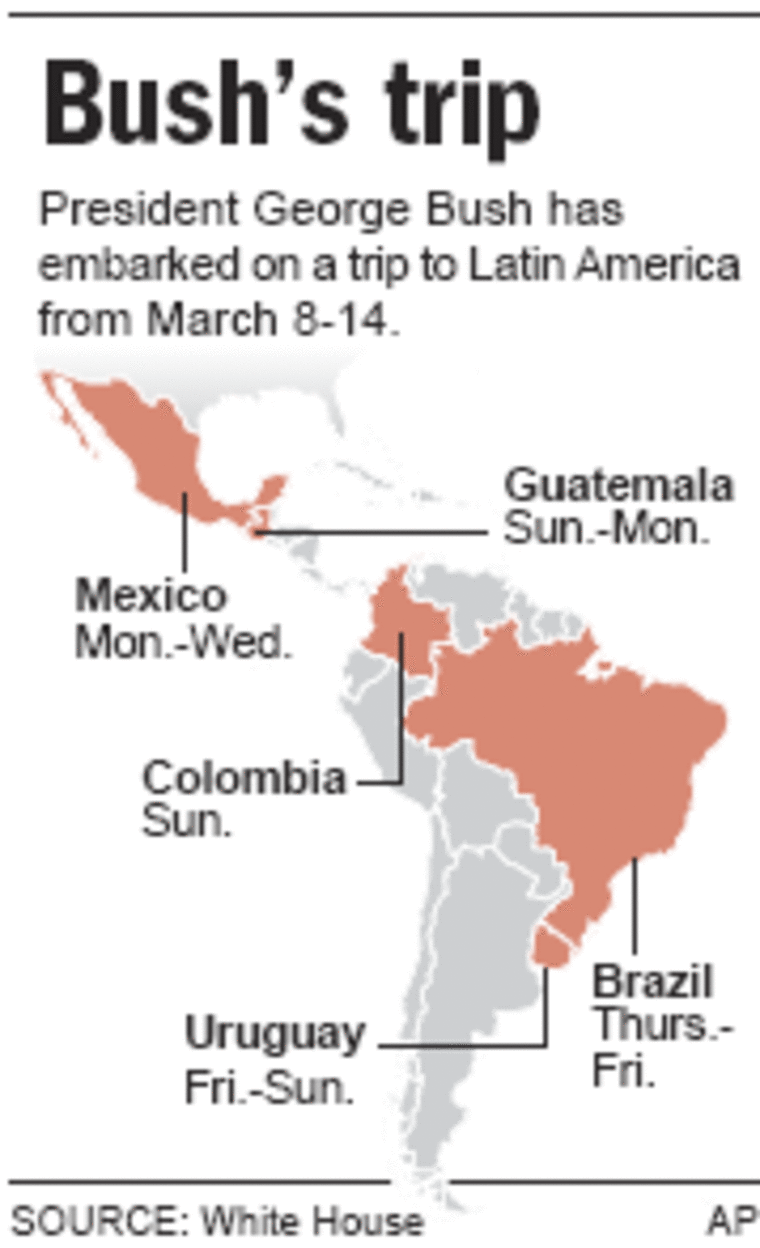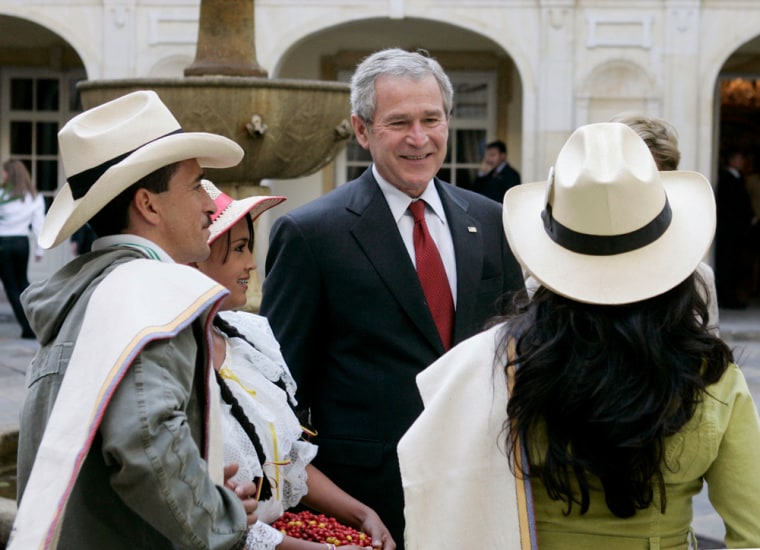President Bush renewed U.S. support to Colombia, a strong but drug and violence-plagued U.S. ally which receives more U.S. aid than any country outside the Middle East and Afghanistan.
Bush arrived in the nation’s capital on Sunday to meet with President Alvaro Uribe in a show of confidence for Uribe and Colombia’s battle against narcoterrorists. But the stop was clouded by a political scandal involving Uribe, and security jitters had Bush staying only about six hours.
Colombia was the third country on the president’s five-nation tour of Latin America. He began his journey in Brazil, flew here from Uruguay and was headed later Sunday to Guatemala. Bush last stops in Mexico before returning to Washington Wednesday.
Despite close ties between Uribe and Bush, the U.S. president’s visit has generated considerable criticism and strong protests.
About a mile away from the presidential palace that was the site for all Bush’s events, some 2,000 protesters chanted “Down with Bush” and burned American flags.
About 150 of them broke away, attacking riot police with rocks and metal barriers and ripping down lampposts. Some 200 helmeted police in full body armor responded with water cannons to reclaim the street. The president’s convoy passed about 200 yards away. No injuries were immediately reported.
Friday night, a concert by former Pink Floyd frontman Roger Waters featured a big balloon of a pig that said “Patron Bush, Welcome to your Colombian Ranch.”
It was Bogota’s first visit from a sitting president since Ronald Reagan in 1982. Some 20,000 police and heavily armed troops will virtually shut off downtown Bogota to guard against a possible rebel attack.
‘Help them reap the benefits of a democracy’
The president has indicated he will ask Congress to maintain current aid levels to Colombia at roughly $700 million annually to support the Latin American nation’s fight against terrorism and drug trafficking.

“The president looks forward to meeting with President Uribe to demonstrate U.S support for Colombia, highlight positive security and economic developments that have taken place there, and discuss the mutual commitment to the U.S. Colombia Trade Promotion Agreement,” said White House spokesman Gordon Johndroe.
Johndroe also noted Bush would have an opportunity to meet with Colombians involved in various U.S programs “that help them reap the benefits of a democracy as well as demonstrate the compassion of the American people.”
‘We haven’t yet won’
Ahead of Bush’s visit, the Colombian law-and-order president urged for continued aid, crediting the U.S. assistance with helping to make his violence-tortured nation more peaceful and less corrupt. The U.S. has sent nearly $4 billion in mostly military aid to Colombia since Uribe took office in 2002.
“I ask the world, I ask the United States, to support us. We haven’t yet won but we are winning. And we will persist,” Uribe said in an interview last week with The Associated Press.
But Democrats who now control the U.S. Congress have been asking tough questions about that aid.
Eight close Uribe aides in Colombia’s Congress, as well as his hand-picked former domestic intelligence chief, have been jailed for allegedly colluding with right-wing militias in a reign of terror that nearly subverted Colombian democracy.
The scandal prompted Uribe’s foreign minister to resign last month when her senator brother and father, a regional power broker, were implicated for alleged participation in the kidnapping of a political rival.
Concern over human rights record
Many Democrats in the U.S. are expressing concern about Colombia’s human rights record. They also want greater emphasis on social programs—more than 3 million have been displaced by the decades of fighting—and on bolstering an overtaxed justice system.
Colombia remains the source of more than 90 percent of the world’s cocaine despite record aerial fumigation of coca crops. And the leftist Revolutionary Armed Forces of Colombia, or FARC, has neither been defeated nor had any members of its leadership captured.
The paramilitaries, which gained control of the entire Caribbean coast during the past decade, demobilized two years ago under a peace pact with Uribe’s government. The paramilitaries arose in response to kidnappings and extortion by leftist rebels.
Bush and Uribe also were expected to discuss a U.S.-Colombia free-trade agreement now before Congress. Colombian demonstrators called for the scuttling of the pact, signed in November and currently stalled in Congress.
Meanwhile, three Americans have been held by rebels for more than four years in Colombia without the Bush administration taking routine steps toward freeing them, current and former U.S. officials say. Family members have cautioned the U.S. on a rescue attempt that could bring the hostages’ deaths.
Heavy security
The White House is not so confident that it will let Bush stay there overnight. The national police chief has warned of leftist rebel attacks during his trip, and a massive security effort has been mounted to keep him safe.
He will spend most of his stopover cloistered in Bogota’s Narino Palace, one of Colombia’s most heavily guarded sites.
“The president looks forward to meeting President Uribe to demonstrate U.S. support for Colombia,” said Gordon Johndroe, spokesman for the White House National Security Council.
‘He doesn’t dare to say my name’
The Bogota visit puts Bush next door to Venezuela but Chavez will not be at home. Bush is being shadowed on his five-nation Latin American trek by Chavez, the leftist firebrand. He blames U.S.-style capitalism for Latin America’s poverty and is issuing taunts such as “gringo go home” at every turn.
Bush steadfastly refused even to mention Chavez by name during stops in Brazil and Uruguay, where he courted free market-oriented leftist leaders he hopes will counterbalance Chavez and his quest for a regionwide socialist revolution.
“He doesn’t dare to say my name. Several journalists have asked him this week ‘what do you think of what President Chavez says?,’ and he doesn’t answer ... His heart starts racing, he gets tongue-tied,” Chavez said in Bolivia’s poor El Alto city.
‘A positive, constructive diplomacy’
“I’ve come to South America and Central America to advance a positive, constructive diplomacy ... on behalf of the American people,” Bush said in Uruguay on Saturday.
Bush has been pushing a softer message of alleviating poverty in a region where the advance of democracy has done little to close the gaping divide between rich and poor.
Reflecting Latin American skepticism over Bush’s transformation, his trip has sparked street protests. His motorcade passed demonstrators wielding banners that read “Bush murderer” and Bush genocide” on Saturday night in Montevideo.
Chavez, spending a second day in Bolivia and heading for Nicaragua on Sunday night when Bush goes to neighboring Guatemala, blames U.S. policies for the deepening poverty.
Drug war
In Colombia, Bush is expected to focus largely on Uribe’s fight to win Latin America’s oldest guerrilla war and confront the cocaine trade.
Three days before Bush’s visit on Sunday, Uribe pleaded with Americans to continue a $700 million annual aid package that he says has helped stem the violence, corruption and drug trafficking that finance anti-government guerrillas.
“I ask the world, I ask the United States, to support us. We haven’t yet won but we are winning. And we will persist,” Uribe told The Associated Press.
Bogota has received more than $4 billion in mostly military and anti-narcotics aid from the United States since 2000.
Since taking office in 2002, Uribe has sent troops to repel the Revolutionary Armed Forces of Colombia, or FARC, the largest rebel group, and disarm illegal rightist paramilitaries.
Violence has dropped sharply, but the rebels are still a potent force, mainly in rural areas. Colombia also remains the world’s largest cocaine producer, with the United States its biggest market for consumption.
Bush is also expected to try to reassure Uribe about a free-trade agreement signed last year. Democrats who now control the U.S. Congress have demanded changes.
After Colombia, Bush travels to Guatemala and Mexico. Like Colombia, they are governed by the right, in contrast to a recent leftward trend in Latin America.
